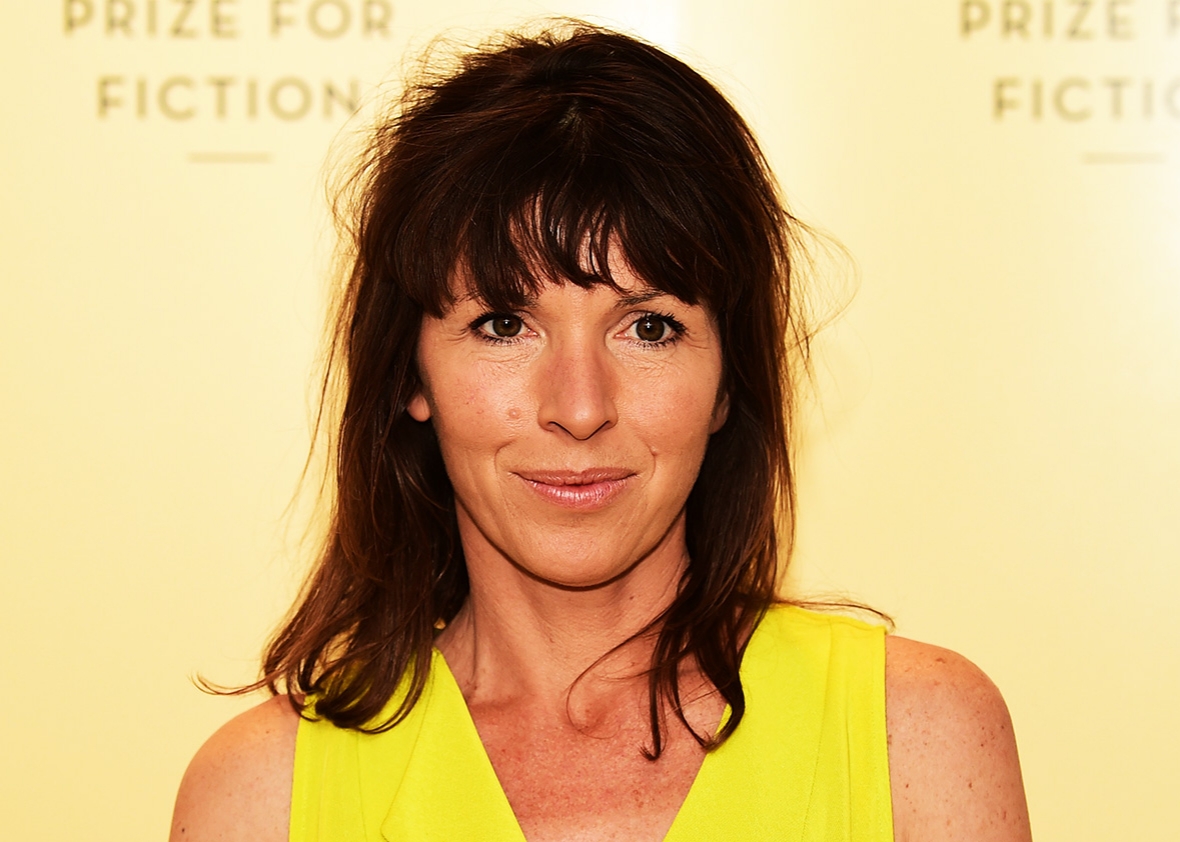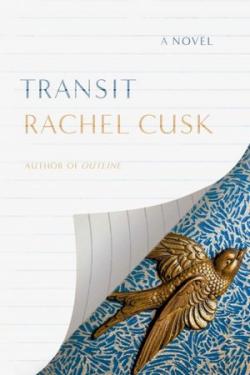
Slate is an Amazon affiliate and may receive a commission from purchases you make through our links.
Rachel Cusk’s Anti-Narrative
Transit is less a novel than a kind of tone poem about what it means to physically expose oneself through writing.

Leon Neal/Getty Images
In Transit, the second novel in an enigmatic triad that began with 2014’s Outline, Rachel Cusk reprises her strategy of seeding the title into an early sentence. The narrator, Faye, receives an email from an astrologer (likely computer-generated, she thinks), who “wished me to know that a major transit was due to occur shortly in my sky.” The cue, funny but also charged with prophecy, vibrates like a tuning fork, commanding our attention. (Attention is a crucial commodity for both Cusk and Faye, so it’s fitting that each book begins by summoning ours with a crystalline toll.) Transit—loosely following Faye’s quest to renovate a derelict London flat while her sons stay with her ex-husband—continues a fascinating experiment. But as in Outline, its title also states an intention: Transit wants to be Cusk’s Purgatorio, her account of a character’s growth, crossing, and metamorphosis. That’s where the novel, wonderful and moving as it is, falls short.
Outline was a dry, peculiar, and hypnotic book about a curiously passive and quiet woman teaching creative writing for several days in Athens after her divorce. Faye relayed with cool scrupulousness the stories that friends, strangers, students, and colleagues told her. She was an alert listener, intelligent but withholding. She hardly editorialized—although her bland summaries of others’ words could devastate—and the overall effect, as Meghan O’Rourke wrote in Slate, was of an author who had decided to forsake the traditional spellwork of fiction, the plot and interiority and dialogue, in favor of a disenchanted noticing, a kind of anti-narrative.
Transit keeps this up. Now back in London, Faye moves through a world crowded with the fragments of other peoples’ life stories. Their narratives take temporary possession of her own in ways that suggest either traumatic dissociation or someone consciously weary of the burden of having a self. She meets her old boyfriend Gerard, who seems to be wearing the same shirt he had on when she left him 15 years ago. She listens to a student describe her obsession with the American painter Marsden Hartley, whose tragic biography, the student insists, “dramatizes” her own ordinary one. Faye’s big act of agency is to buy a dilapidated mess of a house, complete with menacing troll-tenants in the basement. This purchase opens her up to yet more foreign thoughts, desires, vulnerabilities, and memories. A builder recounts how “he would get home … after hours constructing a wetroom that was meant to replicate the experience of standing outdoors under a waterfall, and find that he barely had the energy to look after himself or his own affairs.” “If it was up to me,” he admits to Faye, he would live “somewhere completely blank … where there’s nothing, no colours or features, maybe not even light.”
Presumably, the recessive, receptive Faye can relate. These details are all deliberate, as idiosyncratic or unmotivated as they may at first appear. It’s not quite the case that the people Faye meets illumine various facets of Faye herself—she remains a cipher, however much we might want to speculate about her. But the morsels that she registers clue us in to Cusk’s thematic concerns. For instance, hairstylist Dale muses about freedom—he believes that “to stay free you have to reject change.” He tells Faye he’s grown suddenly “plagued” by a sense of his friends and acquaintances as “children in overgrown bodies.” While he counsels the narrator not to disguise the new threads of silver in her hair, a young boy one chair over reacts with horror to the trim he’s received, running outside into a storm. These tantalizing pieces appear to fit together. They give the book artistic cohesion even as the precise argument (is the static “freedom” of children to be envied or discounted?) hovers just out of reach.
At another point, Faye agrees to sit on a panel at a writing festival alongside two memoirists. Since the event’s organizer, who will go on to “put his warm, thick tongue in [her] mouth,” doesn’t tell Faye and her companions that a covered walkway stretches between the green room and the tented stage, they arrive before the audience rain-soaked and dripping. One author, Julian—“big and fleshy and strangely childlike, like a giant boy”—chronicles the lurid cruelty of his upbringing. He maintains that “all writers are attention seekers: why else would we be sitting up here on this stage?” The other author, Louis, prefers to document banalities. “I don’t want to be known,” he says. “I don’t want anyone to know me.” These various elements—the mishandled “transit,” the humiliation of performing while dripping wet, the impulse to showboat and to hide, the sexual presumption—add up to a kind of tone poem about what it means to physically expose oneself through writing.
Water, with its Ovidian connotations of fluidity and change, swirls through Transit as it did through Outline (where the most dramatic real-time events happened on a boat and fiction was compared to a “magic river”). In addition to the builder who constructs artificial cataracts, the sodden literary panel, and the unhappy kid who flees from the hair salon into the rain, Faye’s friend Amanda gets drenched by her apartment’s indoor sprinkler system; every few pages, another child dissolves in tears. For Cusk, the embarrassment of wetness can become the catharsis of finally being clean. Voices and selves melt together. Reality itself is not so much concrete as (per the poet Elizabeth Bishop) “flowing, and flown.” One of my favorite scenes occurs on a beach: A vacationer sees, “running along the sand beside the frill of surf … a pack of dogs. Their silence and lightness and speed was such that they appeared almost to be some kind of hallucination.” They are Arabian hunting hounds, trained to stream behind a falcon or hawk, the bird guiding them toward their prey. “The two principal dogs worked in concert,” Faye’s student explains, “the one taking over while the other rested its concentration and then back again.”
This idea, of the two dogs sharing the work of reading the hawk, was one he [the student] found very appealing. It suggested that the ultimate fulfillment of a conscious being lay not in solitude but in a shared state so intricate and cooperative it might almost be said to represent the entwining of two selves. This notion, of the unitary self being broken down, of consciousness not as an imprisonment in one’s own perceptions but rather as something more intimate and less divided, a universality that could come from shared experience at the highest level—well, like the German trainer before him, he was both seduced by the idea and willing to do the hard work involved in executing it.
It is a lovely ars poetica. The problem is: Transit’s forms don’t quite match its themes as perfectly as Outline’s did. When the trilogy began, Faye was reeling from a divorce, in a foreign country, her sense of self so effaced that she could only be a conduit for other voices. But in this new novel, she rebuilds a flat and tries to find her footing. She no longer believes, as she tells a dinner date, “that it was only through absolute passivity that you could learn to see what was really there. My decision to create a disturbance by renovating my house had awoken a different reality … I had started to become … angry.” If this is the case, then Cusk’s choice to write Transit with the same languor and mildness that characterized Outline seems curious and slightly disappointing.
That romantic dinner, though, which comes almost at the end of the book, is a revelation. Instead of narrating the man’s conversation, Faye can’t stop talking about herself. She says she “desires power.” It’s as if the transformation the book has teased from the first sentence has finally, a few pages from the back cover, started to take. The scene feels immensely satisfying, and almost too late. At very least, it whets the reader’s appetite for the third chapter.
--
Outline by Rachel Cusk, Farrar, Straus and Giroux.
Outline
Check out this great listen on Audible.com. A luminous, powerful novel that establishes Rachel Cusk as one of the finest writers in the English language A man and a woman are seated next to each other on a plane. They get to talking - about their destination, their careers, their families.

